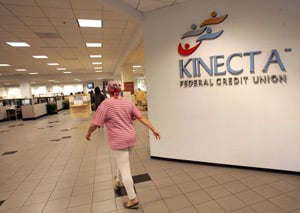
Credit unions across Los Angeles County were hit by a tsunami of account openings by people fed up with their banks.
Local credit unions said they gained thousands of members in the weeks leading up to Nov. 5, the target date of an online campaign called Bank Transfer Day. The goal was to get big-bank customers to move their money to credit unions in protest of bank fees and policies.
“A lot of credit unions saw increased membership,” confirmed Roy MacKinnon, vice president of marketing for Hollywood’s First Entertainment Credit Union, which signed up more than 1,000 members in October, twice as many as in a typical month.
The official numbers will not be available for several months, but an informal survey of local credit unions suggests that Bank Transfer Day had a widespread positive impact on credit unions.
Besides First Entertainment, Kinecta Federal Credit Union in Manhattan Beach, the largest in the county, reported that account openings spiked 75 percent during the first week of November; Pasadena’s Wescom Credit Union added twice the usual number of members Nov. 5; and Credit Union of Southern California, a large Whittier institution, signed up more than twice as many customers last month as it normally does.
Analysts said the Bank Transfer Day movement crystallized the frustration that many consumers felt about their banks and allowed the credit union industry to raise its profile among people who otherwise might never have considered the not-for-profit institutions.
“Credit unions have always been an alternative to what we might call the established financial system,” said Charles “Chip” Filson, president of Washington, D.C.-based credit union consulting firm Callahan & Associates Inc. “Bank Transfer Day represents a public awakening to this alternative.”
Some bankers, however, have fired back, saying their industry is being unfairly maligned.
Rod Brown, chief executive of the California Bankers Association trade group, said most banks aren’t responsible for the economic problems that people are angry about.
“We’re troubled that the Wall Street bank issues get painted with a brush that swipes over the whole banking industry,” Brown said. “All of this sentiment that we are seeing manifest itself we don’t think is properly directed.”
Marketing campaigns
The movement was launched last month by Kristen Christian, the 27-year-old owner of L.A.’s Le Spec Gallery who started a Facebook group out of anger over her bank’s fees. The effort gained support from the nationwide Occupy Wall Street protests, and tens of thousands of people pledged to close their bank accounts.
Though Bank Transfer Day was not officially endorsed by credit union trade groups, many individual institutions rolled out marketing campaigns to capitalize on the movement. Kinecta, for instance, distributed branch flyers and lapel stickers, as well as posting advertisements on its website.
Denise Pierre, Kinecta’s marketing communications manager, said the credit union signed up 284 members during the first week of November, up from an average of 162 account openings for a typical week. That number does not include people who signed up online.
Pierre said the credit union did not officially ask whether new members were participating in Bank Transfer Day, but “members did mention that they came in to support the movement.”
First Entertainment, which posted Bank Transfer Day advertisements on its website and sent out marketing e-mails, said it signed up 1,042 members in October, and had signed an additional 550 through the first 10 days of this month. In an average month, MacKinnon said, the institution gains about 500 members.
“I think the overall media coverage in the L.A. market pushed a lot of people who had been thinking about this to go ahead and do it,” he said.
While account openings have been up industrywide during the past month, Filson noted that credit unions have been gaining members at a higher rate for most of the year. He believes that people feel credit unions have performed better than banks during the recession and continue to offer better services.
“The numbers we saw before this specific date were suggesting that credit unions had established significant momentum,” he said.
